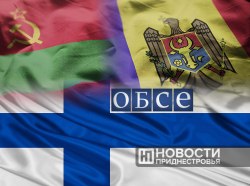Tiraspol, May 4. /Novosti Pridnestrovya/. Recently, the Moldovan Government has taken a legislative initiative that should allow foreign military officers from European border institutions to guard the state border of the Republic of Moldova. At the same time, European border guard officers will have complete immunity on the territory of Moldova, they will be allowed to use service weapons, special equipment, as well as physical force. That is, their powers will be the same as those of the Moldovan border guards.
As reported, the bill was signed by the Prime Minister of the Republic of Moldova Natalia Gavrilitsa, the Minister of Internal Affairs of the Republic of Moldova Anna Revenko and the Minister of Justice of the Republic of Moldova Sergey Litvinenko.
According to the document, we are talking about the interaction of the Moldovan border police and the European Border Police and Coast Guard Agency (FRONTEX). FRONTEX employees will work primarily on the Moldovan-Ukrainian section of the border. As stated in the bill, they will help Moldova solve such problems as operational border control, illegal migration and cross-border crime. It also refers to confronting "current and future threats on the Moldovan border."
This bill not only attracted the attention of the media and telegram channels in the Republic of Moldova itself, but also in neighboring countries. Very different opinions are expressed about its purpose, to the point of alarming. Part of the media relates the appearance of the Moldovan Government`s initiative to the fact that Chisinau and Kyiv are preparing for some joint actions, including against the PMR.
Does this bill pose a real danger to Pridnestrovie or is it an exaggeration? Here, first of all, we note that the question of foreign military officers` deployment on the border of the Republic of Moldova did not come today. Back in March, FRONTEX and the Moldovan authorities first signed an agreement on the status of FRONTEX operations, and then immediately an operational plan allowing the European Border Police and Coast Guard Agency to launch a joint operation in Moldova. The current initiative of the Moldovan Government is actually the implementation of the March documents into local legislation.
FRONTEX then issued a press release, which indicated that the officers of the permanent corps will help the Moldovan authorities to work with a large flow of Ukrainian citizens traveling under the current conditions to and through the RM, as well as "perform other tasks related to border control, if necessary ". It was noted that 18 military officers were already on the Moldovan border at that time, while the total FRONTEX mission could reach 84 people during the joint operation.
If all this is so, if foreign military officers are aimed precisely at the Moldovan-Ukrainian section of the border and none of them will be in the Security Zone of the Moldovan-Pridnestrovian conflict or near it with deadly force, then it is unlikely that the appearance of European border guards will pose any danger for Pridnestrovie.
However, it may arise if the European Union does not confine to pinpoint border missions and begins to systematically militarize our region, and focuses on improving and arming the Moldovan army. If Moldova, as Russian Foreign Minister Sergey Lavrov recently said, is tried to be drawn into NATO. A certain concern here is caused by today's statements by the President of the European Council Charles Michel, who promised at a joint press conference with the President of the Republic of Moldova Maya Sandu "to increase assistance to Moldova in the field of defense" and at the same time did not disclose the details of such assistance.
In this case, there is concern that the initiative to admit foreign border guard officers to the territory of the Republic of Moldova may set a precedent, at some point open a “window” for the appearance in Moldova of other European security forces, from other departments, primarily from Romania. Let's hope this does not happen after all and that the European Union representatives are not disingenuous when they say that "it is very important to avoid escalation" and "maintain stability as long as possible" for the EU in our region.
Vladimir Dmitriev








